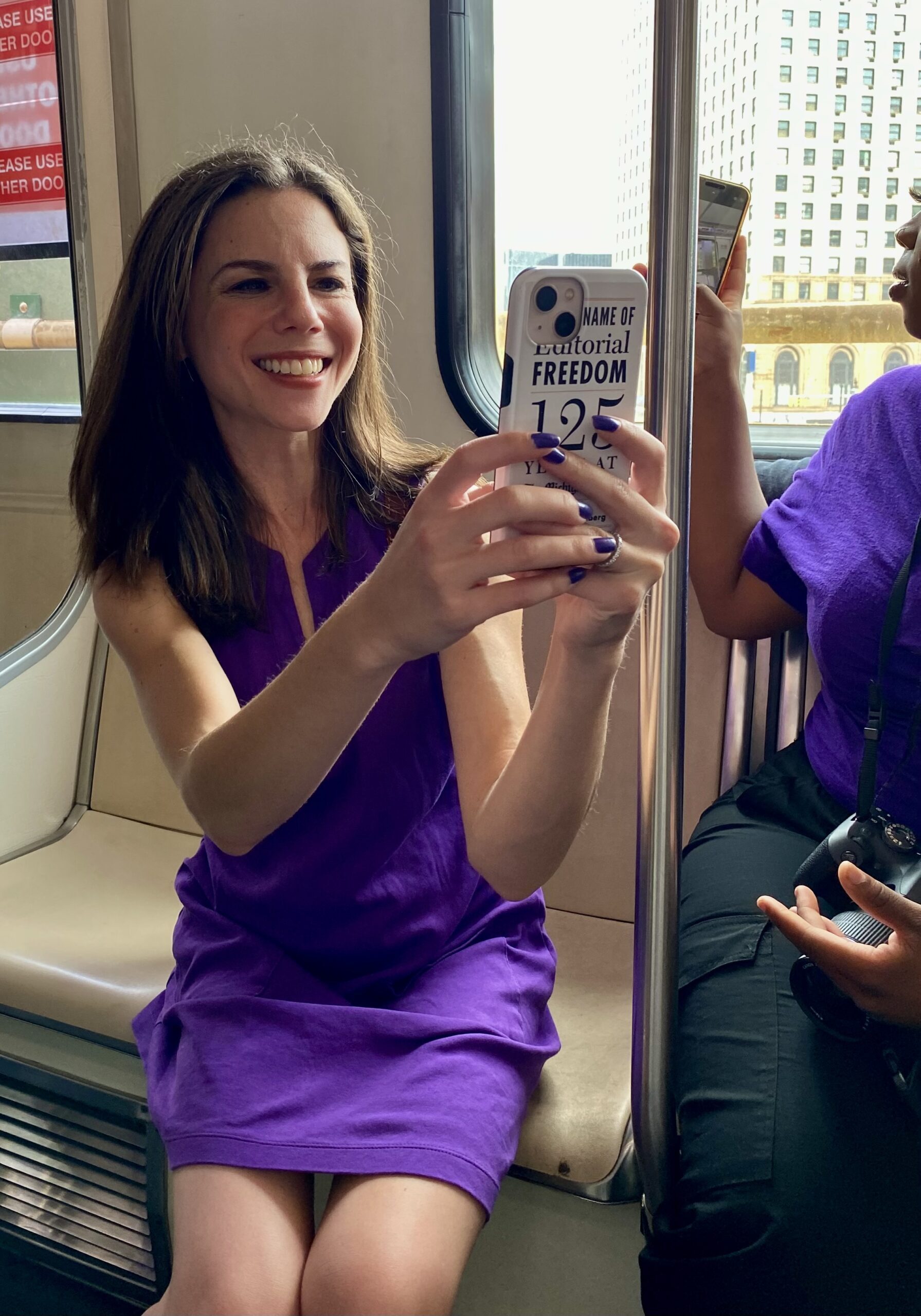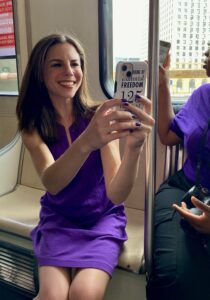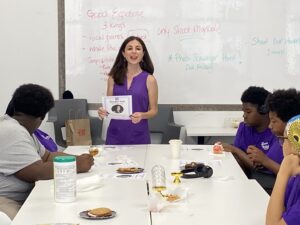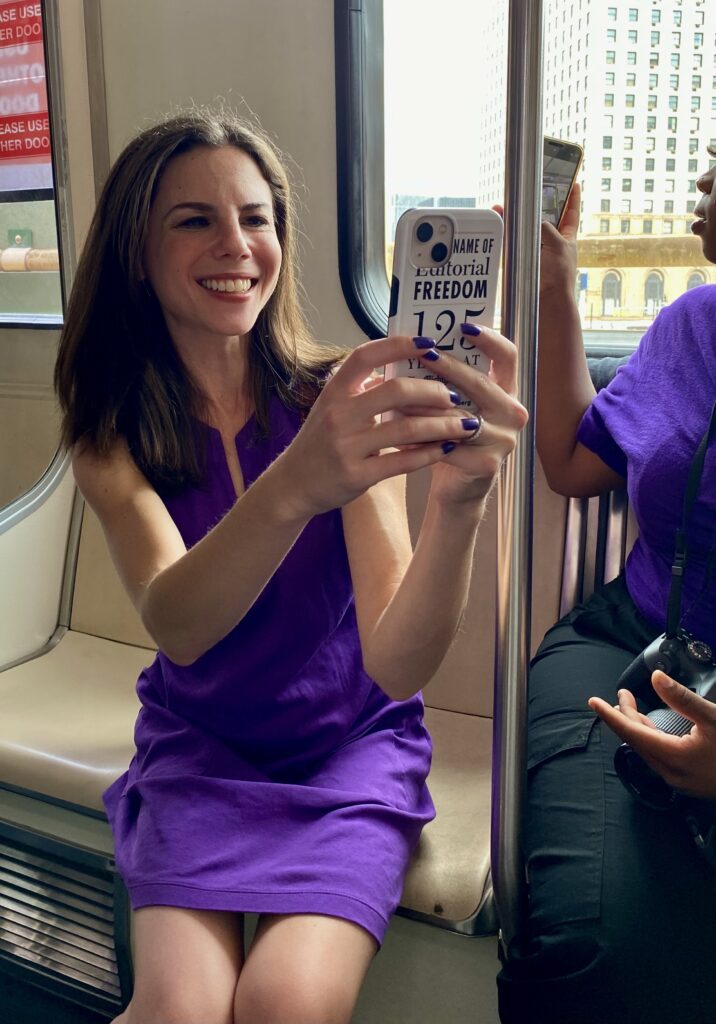Source: Michigan News

Stephanie Steinberg

Stephanie Steinberg
Five years ago, Stephanie Steinberg created the ultimate writers group.
The University of Michigan alumna, former editor in chief of the Michigan Daily and journalist for US News and World Report, CNN, the Boston Globe, USA Today and The Detroit News, had been writing about entrepreneurs and decided to become one herself.
The Detroit Writing Room, founded in 2019, features 30 writing coaches and the New York Writing Room, which came a couple years later, has 15 writing coaches. Steinberg has also created a nonprofit arm – Coaching Detroit Forward – to offer free summer camps on writing and photography for Detroit students.
Q: How did your experience at the university inspire what you’re doing today?
The main thing is that I joined The Michigan Daily during Welcome Week. I was barely on campus, and I walked in the doors knowing that I wanted to go into journalism. So that was my mission, was to join the Daily. And I always tell people I majored in communication studies, but I really majored in The Michigan Daily. That is where I spent all of my time – I slept there, lived there basically for four years. But that was really instrumental in forming my career as a journalist. And I was able to get pretty amazing internships because of my experience at the Daily. I interned at CNN and USA Today and the Boston Globe right after graduation. So I don’t think I would’ve been able to get those experiences had I not been a writer and editor at The Michigan Daily. And truly running the paper as editor-in-chief my last year taught me business skills that I don’t think I would’ve gained from my classes. I was running a team, at that time, of 125 students.
And the connections I made too while at Michigan were really instrumental in my career. Laura Berman was a former Michigan Daily staff writer and spoke to the paper at one point. I met her along the way and she became one of the greatest mentors in my career. That’s why I wound up at The Detroit News when I moved back from Washington, D.C. and came back to Detroit. I was looking for a job, and Laura was able to vouch for me. I really owe my career to The Michigan Daily, and I still try and support the paper and give back when I can. It’s why I edited the book on the Michigan Daily, In The Name of Editorial Freedom. It was a way to honor the paper and thank everyone who came before me for paving this path.
Q: You did have a number of very cool professional experiences, and you were at The News when you decided to start the Detroit Writing Room. Okay. Tell us about that, and how did that all come together?
So I moved back to Detroit in 2016 from Washington, D.C. where I worked for several years at US News and World Report. My husband and I came back to Detroit, and I was very lucky to get a job as a features reporter at The Detroit News. I interviewed a lot of young entrepreneurs, artists, creative people in the city of Detroit who were all doing these incredible things, starting something from nothing. And it kind of sparked this interest in me after interviewing all these people and seeing that they’re helping the city thrive and grow. I thought it’d be fun to start something of my own. And I thought about all the things the city needed at that time and didn’t have. There was really no local bookstore in downtown Detroit.
In the city center itself, around the Campus Martius area where I lived, there wasn’t any type of local bookstore there. I had just come out with the book In the Name of Editorial Freedom a year before and was looking for places to give book talks, and there really wasn’t anything. So number one, I thought, I wish there was a place downtown to give a book talk and a place where authors could go. Then I also, as a reporter, often had people asking me for help with their writing, whether it was a cover letter or perhaps an application for something, and I would help them, but I often thought, man, I wish there was a service that I could send these people to where they could get help with all these writing needs.
So I started thinking about this idea: What if I had gathered all my friends in journalism and authors and communications professionals, and created something where people could come to us and get coaching? And then the professionals could get paid for their time rather than volunteering all the time to help people with their writing.
And then the third leg of it – there wasn’t really a space for creatives to come to, whether it was a book talk or a writing workshop or an open mic night experience, which we did a lot of those before the pandemic, to have a creative space where people could connect and meet each other. So all these ideas percolating in my mind eventually formed into the Detroit Writing Room and what it became.

Stephanie Steinberg speaks to participants in the summer photography workshop she sponsors through her nonprofit Coaching Detroit Forward.
Q: So then the pandemic definitely shifted the way you were able to connect. And so what does it look like now? Are you looking to return to a physical space at some point?
Right now it’s a very hybrid model. So we still have virtual coaching so that people across the country and world can still sign up with our coaches. As the winter hits, we will likely have a little bit more virtual workshop opportunities. And then there’s select in-person events, such as the author series we’ve held at the Whitney in Detroit the past two summers, and then we’ve partnered with Bamboo to hold specific workshops.
And we also work with local bookstores. We held a workshop at Next Chapter Books in Detroit in the spring, and then we’ll be at 27th Letter Books in September for a picture book workshop. So we’re trying to reach everybody wherever they are. Easier said than done sometimes, but as far as your question about returning to a physical space of our own, I don’t know. It’s been really interesting to see how this model goes as far as going out into the community and meeting people at various spots around the city and metro Detroit. And I think it’s actually working well where we’re using other venues and going other places into the community.
Q: So tell me about the impact that you’ve had on individuals throughout the metro Detroit area and New York on their writing trajectories and their projects. What do you want to brag about?
Oh man, there’s so much. It’s funny because we just turned five, so one of our interns put together a celebratory video in June featuring some of the people that we’ve helped along the way, and it was actually a pretty amazing moment for me to sit back and realize we’ve really helped a lot of folks publish books or create podcasts or launch a blog or even just have a small part in some sort of writing project.
One of my favorite stories is about a New York City public school teacher that we coached. We helped her with her Fulbright application to attend a program in Morocco, and she was so nervous. She had applied before a couple times and didn’t get it and came to us seeking help, and this year she got it!
Then of course, there are all the people who published books, coach Laura Berman and a couple other coaches helped author Gerry Boylan, who’s based in Royal Oak, publish several books in the last couple years, and there’s a lot of people still pitching their manuscripts. I have to say. This is a long haul game. So even though we’ve been around for five years, there are people who are still working on pitching agents and publishers, and I’m really excited to see where those manuscripts land and eventually get them on a bookshelf.
But yeah, there’s just so many stories. There’s one writer who came into the Writing Room in February 2019. I’ll never forget, she liked to write, but she had never published anything or really showcased her work anywhere. And she had an idea for a book, and she just wasn’t sure how to get started. I suggested that she start small. Why don’t you launch a blog first? She was a parenting expert. I suggested ‘Share your parenting expertise in some articles, and maybe eventually those articles can turn into a book.’ Fast forward five years later, she’s launched this huge website, a podcast, she is working on a book. She left her full-time job to pursue this platform that she started, and her writing itself has just improved exponentially. So she doesn’t really even need me anymore to coach her on her writing. 
Q: So what is next for you? Are you working on any writing projects right now?
So in addition to running the Detroit Writing Room and Coaching Detroit Forward, I still freelance for US News and World Report and also USA Today. So I freelance edit for them. I have been freelance writing myself a little bit more often. I am a freelance journalist and editor, so I’m always working on various different projects.
Michigan Central reached out in the spring to me. They wanted to put together a magazine for the opening. So I said yes, and I’m still waiting on when it’s going to be released, but I helped interview about 30 different Detroiters regarding their memories of the train station and how it was meaningful to them back in the day.
Q: Are you familiar with novelist Louise Penny? She has a series of books set in a fictional town called Three Pines. She has said that she created this place and populated it with people she wanted to know and spend time with. And it kind of feels like you’ve done the same thing in creating Detroit Writing Room. Tell me a little bit about how you selected your coaches.
You are spot on. At the beginning, the majority of our coaches were people I knew, people I had worked with at various publications, people in the local Detroit community, obviously who I knew who were authors or communications professionals and people I could trust. I knew they were credible and reputable and had award-winning work. And yes, you’re very right in the sense that I almost created my own mini newsroom. As a journalist, you work in newsrooms with editors and writers and photographers and graphic designers, and if you look at the Writing Room, it’s very similar to that where we have talented people and all these different beats.
You are right in that I also wanted to surround myself with good people, people I wanted to come to work with every day. So that’s been important to me. When new people reach out wanting to become a coach, I look at their expertise and credibility and the work that they’ve produced. But it’s also important who they are as a person, especially when you’re coaching other writers and people who might be scared to share their work or very timid about the process. So making sure everyone we select is kindhearted and approaches things in a way that everyone feels valued when they get feedback and criticism is important.


